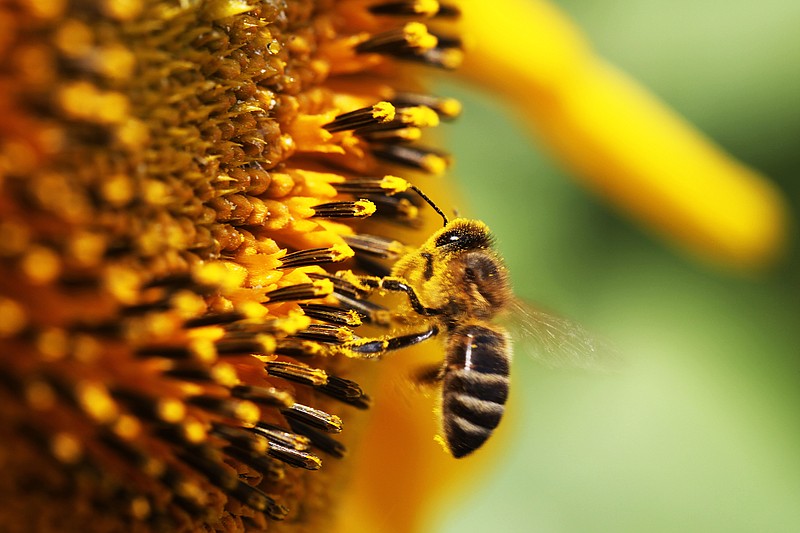When the buzzing stops, we're in big trouble.
The quiet already has begun in many places, and with that quiet comes fewer apples, fewer melons, lower almond crops, diminished vegetable gardens.
We must not think of this impending loss as just a depletion of wildlife. Almost all flowers - and especially fruit and vegetable blooms - depend on bees, butterflies, moths and other pollinating insects to flourish, to fruit and to reproduce. Experts tell us one in every three bites we eat was made possible by the pollination of bees.
We hear a lot about honey bees and bee colony collapse. In Tennessee alone, beekeepers tallied a 25 percent total winter colony loss in the cold months of 2016/2017, according to the Bee Informed Partnership, a nonprofit collaboration of leading research labs and universities in agriculture and science to better understand honey bee declines in the United States.
But honey bees - which are not native to North America but were introduced here by white settlers from Europe - are just one indicator of the problem.
With close to 4,000 native bee species known in North America (and more we have not yet cataloged), one would think we should not be at risk of losing some of the best farmers we have.
But, in fact, many of our busy bees, flutter-butters and night fliers (even bats - some of nature's most voracious pest eaters) are also at risk of disappearing.
That makes our native bees - from tiny Perdita to large carpenter bees and bumble bees - an unappreciated treasure. They had been doing all of the pollination on this continent before the arrival of the honey bee imports from the Old World. And our homegrown bees continue to do a great deal of our pollinating now - especially when it comes to native plants.
Bugguide.net writes that the honey bee, remarkable as it is, doesn't know how to pollinate a tomato or an eggplant flower, yet some native bees are masters at it. Almost the same is true for pumpkins and squash, blueberries and cranberries, which are more efficiently pollinated by native bees than by honey bees.
Butterflies, too, are losing populations. Probably the most counted butterfly is the monarch, which winters in Mexico and travels northward over the United States to breed in the U.S. and Canada. In 1996, monarchs were observed overwintering over 18.19 hectares in Mexico. In 2013, they were observed only on .67 hectares. In more recent years monarch numbers have risen slightly, to 2.4 hectares this year - in large part because of a major education campaign to save the monarch and milkweeds - the only plants on which a monarch will lay its eggs.
Yet the same pesticides and herbicides used to kill mosquitoes and dandelions are nondiscriminatory bee and butterfly killers, too. So is habitat destruction. Especially dangerous to our native bees and butterflies are pesticides containing neonicotinoids. The chemical was developed in the 1980s and 1990s as a "safer" pesticide for human use. But it turns out to be a deadly and long-lasting neurotoxin for beneficial bees, butterflies, moths and other friendly pollinators.
Once a plant is treated with a neonicotinoid, the systemic chemical remains in the plant tissues and is carried in sap to new tissues as the plant grows. The chemical can also adhere to soil in which a plant is grown, creating a long-lasting reservoir for further contamination. The chemical's half life is 1,000 days. That means it takes almost three years for the concentration of a neonicotinoid to reduce by half in the environment. If that's not scary enough, consider that neonicotinoids are the most widely used pesticides in the world - used to treat about one-third of U.S. crops.
Some local folks here are beginning an education process to help our pollinators. Ann Brown, of Lookout Mountain, last year persuaded both Lookout Mountain, Tenn., and Lookout Mountain, Ga., to become "Bee City USA" sites. Bee City USA is a nonprofit national organization that galvanizes communities to sustain pollinators by creating healthy habitats, rich in a variety of native plants and free or nearly free of pesticides. The Bee City model is dedicated to making the world safer for pollinators, one city at a time. On May 20, the two Lookout Mountain towns plan a free pollinator festival from 1-4 p.m. at the Lookout Mountain Elementary School gym.
We don't usually think of wild creatures, especially bees and butterflies, as having lives beset with goals, challenges, family responsibilities and day jobs for us. At best, we admire their instinct which we often categorize in the most basic urges: eat, mate, lay eggs, crawl away to die.
That's our folly.
We are, really, all part of the web - the web of life.
